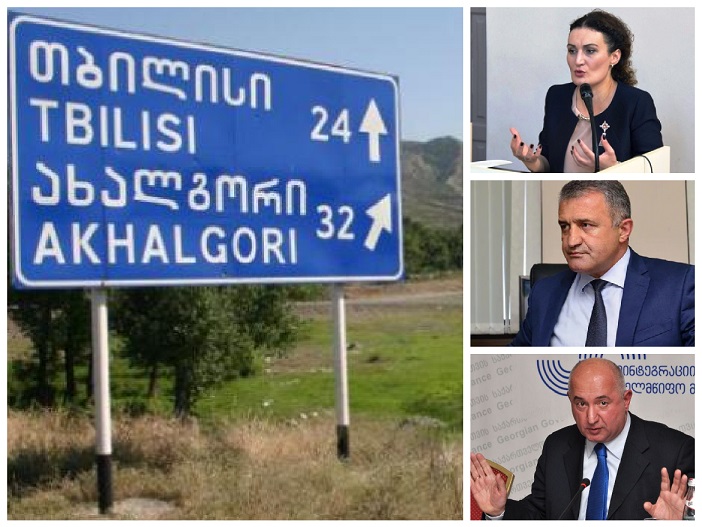Lado Bitchashvili, Shida Kartli
In the end of August, 2019, arrangement of the Georgian and Ossetian police checkpoints nearby Chorchana-Tsnelisi villages created a new crisis, which was impossible to subdue even eight months later. Tskhinvali de-facto government demanded the Georgian side to remove the Georgian police checkpoint nearby Chorchana village and when they could not reach agreement, Ossetian side arranged a police checkpoint in Tsnelisi village; however it could not resolve the problem, just the opposite – it further worsened the crisis.
Tskhinvali de-facto government closed all crossing points connecting the residents of the occupied territory with the rest of Georgia and left them in isolation. This decision was particularly difficult for the population of the occupied Akhalgori district. The Akhalgori district crossing point, which was closed in September 2019, was opened only once for several days. The Akhalgori residents have to cope with many problems but limited access to medical services is the worst. During the past eight months, 13 people died in the occupied Akhalgori district; they could not get adequate medical treatment in Akhalgori hospitals and Tskhinvali de-facto government did not allow the families to take the sick people to Tbilisi.
For the prevention of the spread of COVID-19, in the course of strict quarantine regime, Tskhinvali de-facto government refused the families to transport sick patients to Tbilisi because they state it will increase risks of importing the COVID-19 into the occupied Akhalgori district. Two more patients are in grave conditions in Akhalgori and unless they are transported to Tbilisi based hospital, the number of the deceased patients may increase in Akhalgori.
The State Minister of Reconciliation and Civic Equality Ketevan Tsikhelashvili blamed the Tskhinvali de-facto government in the discrimination of ethnic Georgian people.
“Although hotline is working, people are not allowed to travel to the Georgia-controlled territory. These patients are still in Akhalgori and unfortunately, I must note that these restrictions particularly harm the ethnic Georgian population of Akhalgori district that is follow-up of the ethnic discrimination. Since September 4, 2019, in fact, the only crossing point has been closed and until now 13 people died because of similar attitude of the regime, that contradicts the human principles,” Ketevan Tsikhelashvili said.
“Bibolov meanly and dishonestly continues execution of the Georgian population,” the former state minister for reconciliation and civic integrity Paata Zakareishvili evaluated the ongoing situation in the occupied region and added that de-facto president of South Ossetia Anatoli Bibilov acts with double standards when after announcing the strict quarantine in the region, he allowed the Red Cross to transport several ethnic Ossetian citizens from the occupied Tskhinvali to the hospitals in the Georgia-controlled territory. While, two ethnic Georgian citizens died in Akhalgori district because they were refused to travel to Tbilisi.
“As far as I know, in similar critical situation, Bibilov has sent three-four people to the rest of Georgia for medical treatment. Bibilov cannot dare to refuse his people – ethnic Ossetians – to travel for medical treatment here; if he refuses, Ossetians will demand him to ensure their quality medical treatment on the place or send them to Vladikavkaz that will cost expensive for the de-facto authority. On the other side, Bibilov has taken Georgian residents of Akhalgori district as hostages that is demonstration of double standard and ethnic nationalism. Bibilov, instead resolving the Tsnelisi problem with the Georgian side, took the residents of Akhalgori district as hostages. Kokoiti [former de-facto president of South Ossetia] used to say that Akhalgori district population was his people and at least formally paid some attention to them. As for Anatoli Bibilov, he lost absolute control of himself as well as the responsibilities of informal governor in front of his population. Tskhinvali de-facto president Bibilov could not find common consent with the Georgian side and could not resolve the Tsnelisi issue; consequently he has nothing to tell his electorate in South Ossetia and relatively punishes ethnic Georgian population in the occupied territory,” Zakareishvili said.
Before being the state minister, Paata Zakareishvili was actively engaged in the Georgian-Ossetian and Georgian-Abkhazian peace dialogue. His experience and contacts were significant assets for the state minister of reconciliation. After quitting the position, he as a conflict scientist, continues working on the conflict resolution from the civil sector. Zakareishvili said that what is happening in Akhalgori now is caused by irresponsibility of Bibilov and unreasonable actions of the Government of Georgia.
“I have questions with the Georgian side – both Shevardnadze and Saakashvili forgot about Tsnelisi village and why it became so important now that everything was done by ignoring the Ergneti meetings. There are no clarifications about it yet. We are now in a deadlock because of arranged Georgian and Ossetian blockposts in Tsnelisi and neither parties intend to remove them because it will be admission of the mistake. We are in the deadlock but we must go ahead; similar things happen in the conflicts to learn lessons and not to repeat them in future. I have contacts with Ossetian side and everybody states that we must overcome this crisis,” Zakareishvili said.
Paata Zakareishvili recommends the Government of Georgia to immediately start the direct dialogue with the Ossetian side.
“If we analyze the current situation, it is a bit strange that the GoG is not able to have direct dialogue with the Ossetian people. What I hear from the Government is: we have informed EU; we will talk about it in Geneva; we have launched a hotline… so there are no direct contacts with Ossetian and Abkhazian sides that is very alarming for me. I was the state minister for five years and I have never mentioned Geneva, hotline, EUMM or Ergneti meetings. We always managed to solve many problems with direct dialogue. Are not the lives of two persons enough to reconsider our politics, and find where the solution is?” Zakareishvili stated.
News
December 13, 2023
Ethnic minorities outside the peace dialogue
November 6, 2023
‘Peace’ agenda of political parties
Popular
Articles
February 13, 2024




